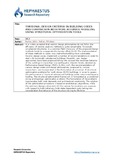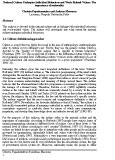Moral and cognitive reasoning features in congenitally blind children: comparisons with the sighted
Article
Moral and cognitive reasoning (within the Piagetian theory) aspects of congenitally blind children ranging in age from 6 to 12 years were examined and compared with those of a sighted sample, matched in age and socio-economic background. The results of the study show that moral and cognitive development in the congenitally blind proceeds at a slower rate, but the developmental lag in the moral domain does not appl y to all moral reasoning features exam ined. The dimension of retributive vs. distributive justice, for example, seems to develop in the same manner in the two samples. Regarding the prerequisite relationships between cognitive and moral development, the reciprocal interaction prediction was the more powerful for the sighted children, whereas foe their blind counterparts, cognitive capacity seemed to exert greater influence on moral development. Possible explanations of the findings are discussed.
- Articles377




